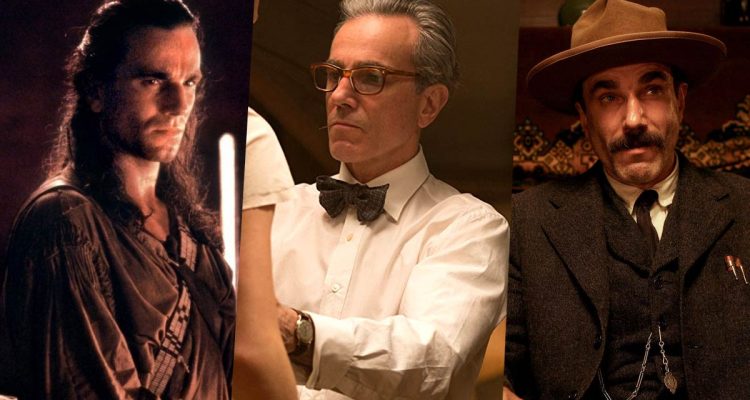Daniel Day-Lewis is incomparable. A looming, legendary figure in cinema, whose stature has cemented after five decades of work as one of the greatest actors in the world, and one of all the all-time greats – period – up there with the likes of Laurence Olivier and Marlon Brando. Known for his all-consuming method approach, which includes staying in character the entire time during the production of a film, like all mysterious figures who are semi-recluse —he doesn’t give a lot of interviews, he goes years in between films and once retired to become a cobbler—everyone seemingly wants a piece of Day-Lewis. This includes filmmakers of all stripes, the public and especially the media.
READ MORE: ‘Phantom Thread’: You’ll Want To Live Inside This Masterful Film [REVIEW]
But Daniel Day-Lewis simply moves to the beat of his own particular, unrushed rhythm. Since 1971, Day-Lewis has appeared in 21 films. That’s an average of 4.2 films a decade, and in the last twenty years, he’s only appeared in seven films. It’s not that Daniel Day-Lewis doesn’t want to work, it’s that a role becomes something he disappears completely into, and clearly, he wants to make that time well spent.
But he’s perhaps not the rigorous perfectionist that we all imagine. “Perfection would be the wrong word to [describe him] because that’s not Daniel,” Paul Thomas Anderson, who directed him in his most recent film “Phantom Thread,” recently told us in an interview. “He works hard. And that, unfortunately, gets translated into obsessive or perfectionist, but fuck, I’ve known him for a while, we’ve done two movies together and searching for perfection is certainly not what he is about. I will speak for Daniel and say, there’s no pursuit of perfection because that’s what a crazy person does and Daniel certainly isn’t that.”
Amassing a relatively small, but indispensable body of work, most of it crafted alongside some of the world’s greatest directors, with “Phantom Thread” hitting theaters on December 25 and the Quad Cinema in New York putting on a Daniel Day-Lewis retrospective that launches today, we thought now would be the perfect and long overdue time to look at his most essential roles.
“My Beautiful Laundrette” (1985)
Stephen Frears’ “My Beautiful Laundrette” is a daring, revolutionary independent achievement, a beautifully bold, taunt, intelligent and bruised look at race, immigration, social and economic impoverishment and hidden homosexuality in downtrodden ‘80s England that isn’t merely elevated but invigorated by the blooming, sensual wit, integrity and dauntless talent of a young Daniel Day-Lewis. Though the film doesn’t completely belong to the future three-time Oscar winner, as it’s lead marvelously, heartfully and sensitively by Gordon Warnecke, his undeniable screen presence is powerful and pulsating. Even from an early age, his greatness is mesmerizing. His electric, palpable chemistry with Warnecke is, at once, stark and stimulating, melancholy and warm. His hardened edge and the tender sexuality he provides throughout this early performance are just a glimpse into the rich versatility he’d bring to his future lead roles. Though initially shot for Channel 4 television, “My Beautiful Laundrette” is also filled with many quiet moments of cinematic intimacy and grandeur. Frears promises the impeccable talent that would come into fuller fruition throughout his impressive filmography. As a stepping stone project, “My Beautiful Laundrette” is gorgeously, astoundingly accomplished. But that’s selling it short. This early Day-Lewis stunner wasn’t just a preview; it’s a greatly dreary, impassionately homespun drama which passionately and rightfully lead these incredible talents to their unstoppable careers – Will Ashton
 “My Left Foot” (1989)
“My Left Foot” (1989)
In many ways, it was his widely acclaimed, much-discussed performance as Christy Brown in Jim Sheridan’s moving, gorgeously realized directorial debut “My Left Foot” that turned Daniel Day-Lewis, a rising, blooming, promising young British talent, into Daniel Day-Lewis, a man of near legend and an actor with an unparalleled dedication to his chosen profession. Embodying an improvised, celebrated Irish painter/author with cerebral palsy, one who could only use his left foot, Day-Lewis captures every precise move, every difficult shake, every struggling ache, every mumbled quip with gripping authenticity and sincerity. It hardly ever feels like a performance. Never escaping the character during production, Day-Lewis broke two ribs, lost a frustrated agent and forced other people to feed him during production. Through going those extra miles, and never allowing himself to dispel the illusion, Day-Lewis’s performance is never offensive or in poor taste. Where other biopics feel insincere or illusioned, Day-Lewis brings a realism to the part that makes this film all the more harrowing, absorbing and emotionally gratifying to watch. It’s the point when Day-Lewis went from becoming a great actor to the best living actor of our times. It rightfully won the actor the first of three Best Actor Oscars, and it finally made Day-Lewis a household name. -WA

